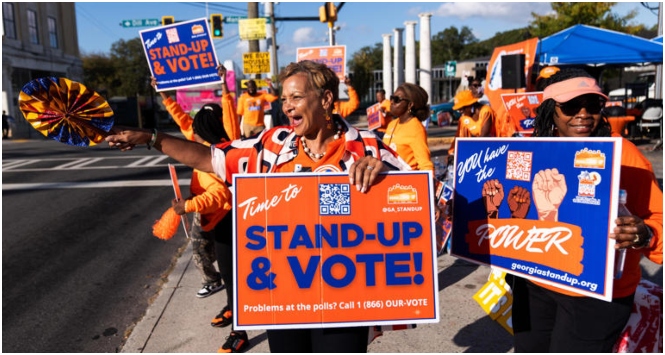As results from the 2024 presidential election rolled in late into the night, Tamieka Atkins, Executive Director of ProGeorgia, reflected on the long hours of tireless organizing efforts led by Black women across the country.
Despite their commitment and mobilization efforts, many felt a deep sense of grief over Kamala Harris’ loss to former President Donald Trump. For Atkins and others, the disappointment is coupled with determination as they strategize for the years to come.
For months, civic engagement groups largely spearheaded by Black women launched extensive get-out-the-vote campaigns nationwide, raising funds, rallying volunteers, and urging people of color to cast their ballots.
In states like Georgia, known for its civil rights legacy, these grassroots organizations contributed to historic voter turnout, even as restrictive voting laws posed additional challenges.
A “Moment of Collective Grief”

Wendy Smooth, a professor at The Ohio State University specializing in gender and political studies, described the emotional aftermath as a “moment of collective grief.”
In Georgia, where Harris had garnered immense support, Black women mobilized voters with block parties, prayer breakfasts, and celebrity-backed events. Many believed Georgia, a battleground state, might signal a shift in the nation’s political landscape, similar to recent years when Black women helped Democrats secure U.S. Senate seats and Joe Biden’s win in 2020.
“We poured so much of our hearts into this,” said Deborah Scott, Executive Director of Georgia STAND-UP, who hosted an Election Day block party to encourage voter turnout. The loss, she noted, felt like a setback for future generations. “I cried for my daughter, my granddaughter, and the young girls who don’t yet understand what’s at stake.”
Advancing a Legacy of Leadership
Despite the setback, Black women activists celebrated other historic wins in this election cycle, including Lisa Blunt Rochester and Angela Alsobrooks, who will serve as the first two Black women in the U.S. Senate simultaneously.
Holli Holliday, president of Sisters Lead Sisters Vote, highlighted these milestones as evidence of Black women’s resilience. More than 1,200 Black women ran for office nationwide, with many securing victories that signal an emerging infrastructure of Black women leaders across the political landscape.
“We’re still here,” said Atkins. “This loss hurts, but our work continues. We’ve built something incredible, and we’re prepared to keep fighting.”
Reflections and Looking Ahead
As activists regroup, Atkins and other leaders acknowledge that while Harris’ loss feels deeply personal, the infrastructure built by Black women leaders provides a strong foundation for the future.
“We’re resilient,” Scott affirmed. “This is a moment to reflect, to rest, but also to strategize for what comes next.”
For Black women at the forefront of political and civic engagement, the loss serves as motivation to strengthen their networks and continue advocating for change.
